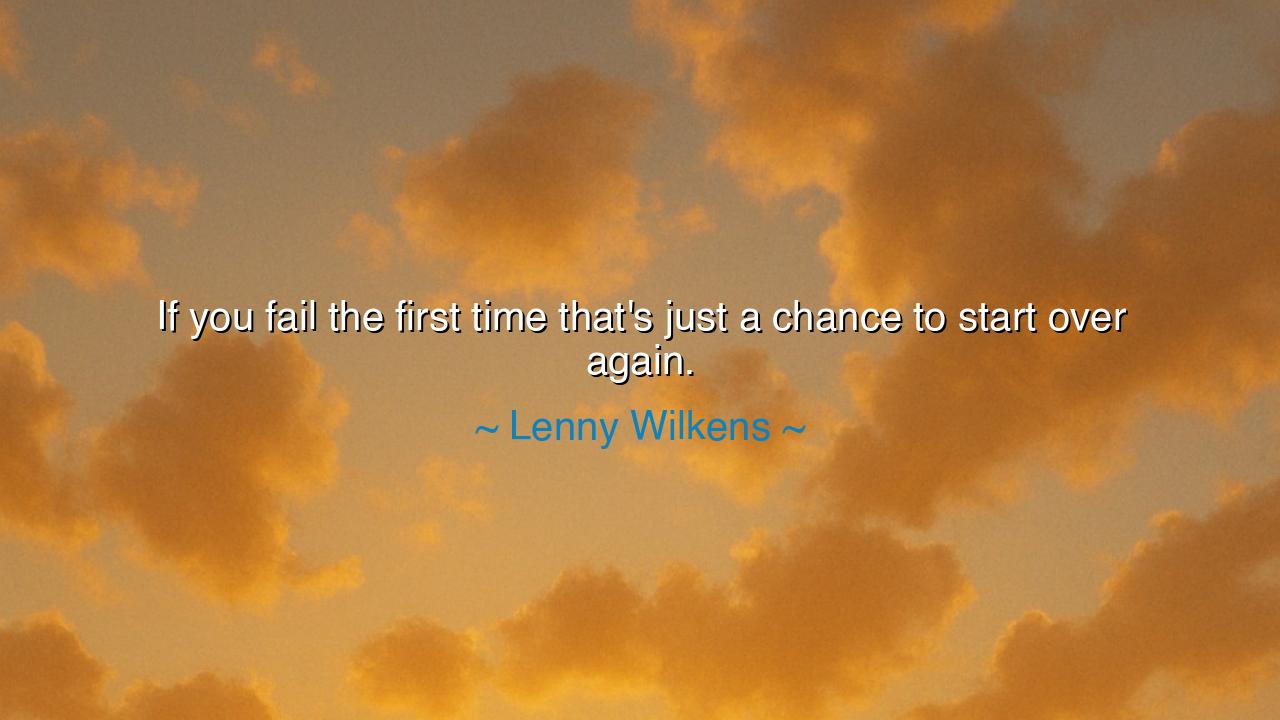
If you fail the first time that's just a chance to start over






"If you fail the first time that's just a chance to start over again." These words from Lenny Wilkens offer profound wisdom about failure and resilience. Wilkens frames failure not as an end, but as a beginning—an opportunity to rebuild, refocus, and try again. This perspective challenges the common narrative that failure is something to fear or avoid, instead suggesting that failure is a natural part of growth—an integral step toward success. In many ways, Wilkens is emphasizing that each setback is not a defeat, but a chance to learn, adapt, and start anew with greater wisdom.
In the ancient world, this understanding of failure as a necessary part of growth was deeply embedded in philosophical thought. Aristotle, the great philosopher, wrote in his Nicomachean Ethics that virtue is cultivated through repeated action, and that mistakes are a part of the process of becoming virtuous. He argued that to flourish as a human being, one must be willing to face challenges, make mistakes, and persist in the effort to live a life of excellence. Wilkens’ quote aligns with Aristotle’s teachings—failure, when met with perseverance, leads to a deeper understanding of self and a stronger ability to rise above adversity.
Similarly, in the realm of Greek mythology, the figure of Heracles embodies this concept. Heracles, renowned for his strength, was tasked with the Twelve Labors, a series of nearly impossible feats. At many points, Heracles faced failure—whether through the initial difficulty of his tasks or his doubts about his own abilities. Yet, each failure provided him with new insight and strength that allowed him to succeed. The lesson of Heracles is clear: true greatness does not come from a life of unbroken success, but from the ability to rise after each fall and to continue the journey with renewed resolve. Wilkens, too, teaches that failure is part of the journey, and that each attempt, even if unsuccessful, brings us closer to victory.
In more recent history, the life of Thomas Edison illustrates the power of perseverance in the face of failure. Edison is famously quoted as saying, "I have not failed. I've just found 10,000 ways that won't work." Edison faced countless setbacks while inventing the light bulb. His many failures could have easily led him to give up, but he understood that each failure brought him closer to the solution. Edison's determination to start over again, to continue his work despite repeated defeats, led to one of the most profound inventions in human history. Much like Wilkens’ words, Edison’s life teaches us that failure is not a stopping point but a stepping stone on the road to success.
Wilkens’ perspective on failure also touches on the importance of mindset—specifically, the growth mindset espoused by Carol Dweck, a contemporary psychologist. Dweck's research shows that people who embrace failure as part of the learning process are more likely to persevere and ultimately succeed. Those with a fixed mindset, on the other hand, see failure as a final verdict on their abilities. Wilkens, like Dweck, challenges us to adopt a mindset where failure is not something to be feared, but something to embrace as a necessary part of the process of growth.
The lesson in Wilkens' words is both practical and deeply philosophical. Failure is an inevitable part of any great endeavor, and rather than allowing it to discourage or defeat us, we must learn to reframe it as an opportunity for growth. Just as Edison found ways to persevere through failure, and Heracles overcame his doubts to triumph in the end, we too must embrace failure not as a final judgment but as a temporary setback—a chance to learn, adapt, and begin anew. In the end, it is not the fall that defines us, but our ability to rise each time, stronger and wiser than before.
In practical terms, we must approach failure with resilience and optimism. Whether we are pursuing a career, a personal goal, or a relationship, we must understand that failure is not a permanent condition. Each failure should be viewed as a chance to reevaluate and improve our approach. Setbacks do not define our worth; perseverance, reflection, and adaptability do. By embracing failure as part of the process and understanding that each attempt brings us closer to our goal, we open the door to endless possibilities and ultimate success.
Let us, then, live with the understanding that failure is not something to fear, but something to embrace. Like Edison, Heracles, and Wilkens, we must see failure as a temporary detour—a necessary part of the journey toward greatness. Each time we face a setback, let us rise up with renewed strength, knowing that the path to success is forged not by avoiding failure, but by persevering through it. With this mindset, we are bound not only to overcome our challenges but to rise above them, ready to start again, stronger than ever before.






AAdministratorAdministrator
Welcome, honored guests. Please leave a comment, we will respond soon